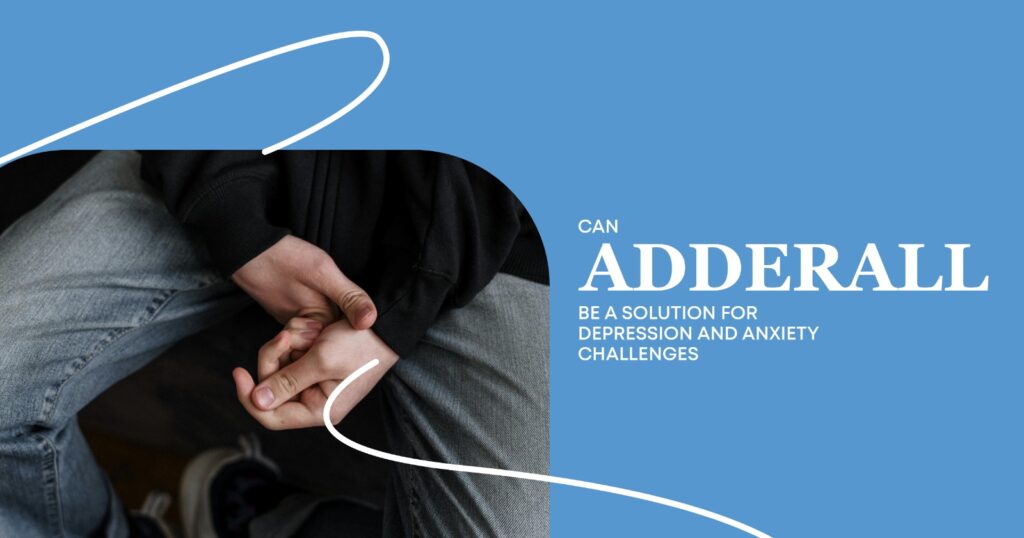Depression and anxiety is a heavy combination that most people can’t endure, which makes finding relief a matter of urgency. In the search for a solution, some people wonder can adderall help with depression and anxiety.
Actually, Adderall is a prescription stimulant mostly given for ADHD and not mood disorders like Depression and Anxiety. Using it to treat these issues isn’t recommended and is considered drug abuse.
However, if you’re still curious if it has any effect at all on your depression and anxiety, keep reading as we explore this medication further.
Adderall for Anxiety Relief and Mental Health Benefits
There are many studies looking at the use of stimulants for treating depression that is resistant to other treatments; however, there is very little information on using adderall for anxiety relief, and most research indicates that Adderall will cause even more anxiety.
The primary clinical application of Adderall is for ADHD. Adderall is used to correct neurochemical imbalances in the brain, resulting in enhanced ability to focus, less impulsivity, and superior executive functioning. These positive effects result in an improved quality of life and greater self-esteem for those who have ADHD.
Understanding Adderall’s Role in Anxiety Relief
Choosing adderall for anxiety symptoms management is harmful. Adderall is a stimulant that raises your heart rate, blood pressure, and causes you to have higher levels of stress hormone (cortisol), and these are all the same physical signs as a panic attack.
While for individuals with ADHD, use of Adderall may help alleviate some of their anxiety, the opposite occurs for most non-ADHD individuals who take Adderall. The major concerns with using Adderall as an anti-anxiety medication include:
- Increasing symptoms of an underlying anxiety disorder.
- Inducing panic attacks or causing excessive restlessness.
- “Crashing” after taking the drug, where one becomes extremely angry and/or anxious.
Using Adderall as a method to treat anxiety does not constitute treating anxiety because it is simply self-medicating, which can be dangerous.
Adderall and Its Effects on Depression
The adderall depression effects are complex and make it a difficult drug to recommend. It might have some short-term effects that give you a sense of improvement, but the long-term effects aren’t worth it.
| Short-Term Perception | Long-Term Reality & Risks |
| Initial mood elevation & energy boost | Intense “crash” leading to deeper depressive lows |
| Improved motivation & focus | Develops tolerance, requiring higher doses |
| Masks underlying fatigue | Worsens core symptoms over time |
| Creates a false sense of well-being | High risk of dependency and addiction |
There are better options for treating depression, and using adderall only makes the situation much worse.
Exploring Adderall as an Anxiety Treatment
Medically, there are no supported uses for Adderall in treating anxiety disorders. Adderall primarily targets the wrong set of brain chemicals to treat anxiety, and while Adderall may give users short-term feelings of false confidence due to a release of dopamine, this confidence will be extremely costly because stimulants have been shown to exacerbate many of the physical symptoms associated with anxiety.

Why adderall doesn’t make a good anxiety medicine:
- The physiological impact: Side effects of adderall include increased heart rate and jitters that can be misinterpreted as panic attacks.
- Rebound anxiety: when the effects of the drug wear off, the anxious feelings return with greater intensity than before.
- Risk of misdiagnosis: it may mask other problems, which could delay a proper diagnosis and effective treatment, like therapy or SSRIs.
Adderall anxiety treatment is like pouring gasoline on fire; while it will likely create a short-term, high-intensity event, it creates more danger down the road by creating a larger problem.
The Mental Health Benefits of Adderall
Adderall mental health benefits in the strictest sense of the word only apply if it is being used for its sole FDA-approved use: for the treatment of ADHD. In that case, the benefits of using Adderall are not related to providing a “high, but rather in providing normal levels of cognitive functioning.
Adderall is used by people who have ADHD as it will help them develop a better balance of their levels of dopamine and norepinephrine, which in turn can improve their:
- Executive Functioning: Organization, planning, and completing tasks.
- Focus: Decrease distractions; therefore, they can focus on one thing for an extended period of time.
- Emotional Control: Less impulsive, less reactive emotionally.
Each of the above areas can also improve self-esteem and lower anxiety caused by difficulty due to the symptoms of ADHD. Again, this is specific therapy to treat ADHD symptoms and NOT to enhance overall mental health.
Adderall’s Impact on Mood Enhancement
Adderall produces an immediate euphoric state and temporary elevation in mood through the rapid increase of dopamine. However, this adderall mood enhancement is a chemical reaction rather than a therapeutic mood-enhancing effect.
Once Adderall leaves the body, the sudden drop in dopamine causes a “crash,” which results in irritability, lethargy, and/or a depressed mood. The constant cycling of highs and lows created by using Adderall can exacerbate pre-existing mood disorders and contribute to addiction because people will often try to recreate the euphoric feeling from the initial use.
Mood stabilization occurs when there are treatments that promote sustained brain chemistry, as opposed to medications such as Adderall, which provide brief chemical alterations.
Emotional Well-being and Adderall
True emotional well-being rests on stability and the capacity to process emotion in a healthy way. Therefore, Adderall and emotional well-being don’t go together since this medication contradicts this foundation directly.
Adderall may produce emotional numbing (which makes experiencing authentic emotions difficult) or increased irritability/emotional instability as an alternative.
- Chemical Dependency: Creates a false sense of being able to manage your life (and emotions), which you are unable to do without the medication.
- Crash: After using Adderall, users may experience increased levels of anxiety/sadness upon coming down from the high.
- Bypass: Keeps users from developing real-world strategies for dealing with their problems.
Ultimately, when one uses Adderall as a method of achieving emotional well-being, they are circumventing the important work of therapy/self-care, and therefore creating a much more unstable emotional state.
How Adderall Contributes to Mental Clarity
The use of adderall for mental clarity works by eliminating the background “mental static” in people who have ADHD, allowing them to think more clearly and be able to organize their thoughts in a much clearer manner, which helps to correct an underlying deficiency in these people.
In contrast, people who do not suffer from ADHD will likely experience extreme but jittery mental concentration. People without ADHD are also likely to experience a rapid burnout of mental resources due to the excessive nature of the artificial focus created by the Adderall.
Learn More at Hillside Horizon for Teens
If you are having trouble with depression, anxiety, or substance misuse (such as Adderall), or if your teenage child is, seek professional help.
At Hillside Horizon for Teens, our staff will offer an evidence-based approach to care that will be both supportive and individualized for adolescents.
We will assist in diagnosing the reason behind the problem and develop a long-term treatment plan so they may heal completely.
Contact Hillside Horizon for Teens today!

FAQs
1. How does Adderall provide anxiety relief and improve mental health benefits?
Adderall is unlikely to give you anxiety relief; most of its effects on anxiety are just the result of stimulants and will be gone shortly after the drug wears off. It has one legitimate use as a medication for treating ADHD in patients who have been correctly diagnosed with ADHD.
2. Can Adderall effectively treat anxiety symptoms, and what should users be aware of?
Adderall is not good for treating anxiety, and it was never intended for this purpose by the FDA. Users need to know that generally, taking Adderall makes people feel even more anxious than they would without the medication.
3. What are the effects of Adderall on depression and emotional well-being?
Adderall produces an initial elevation in mood as a result of the short-lived rise in dopaminergic activity; however, the subsequent “crash” can further exacerbate feelings of depression. In addition, long-term use will contribute to emotional instability (i.e., mood swings, irritability) and dependence on the drug.
4. How does Adderall contribute to mood enhancement and mental clarity?
While the “mood enhancement” is the product of a transitory increase in dopaminergic activity, the “mental clarity” is generally the result of forced, jittery, mentally exhausting focus; both of these positive outcomes are also only temporary and will lead to a crash afterwards.
5. Are there any considerations for using Adderall as an anxiety treatment?
The main thing to remember is not to use it as an anti-anxiety medication because it is not approved for this purpose, and the risk of addiction, worsening of your anxiety, and other negative side effects is greater than the potential benefit. Always talk with your doctor about safe and evidence-based treatments.




